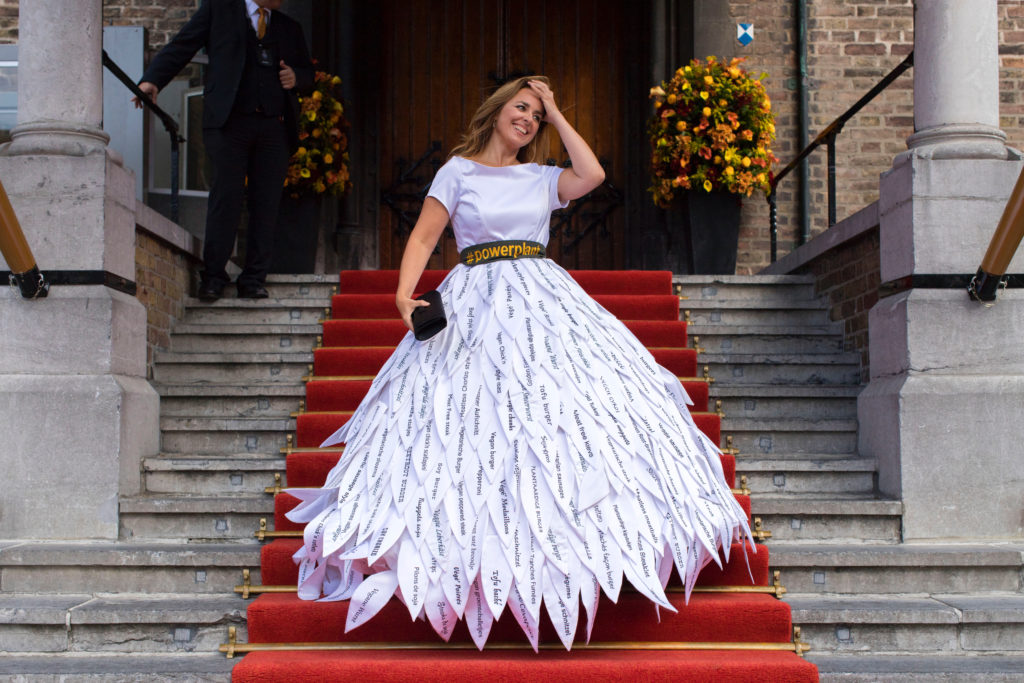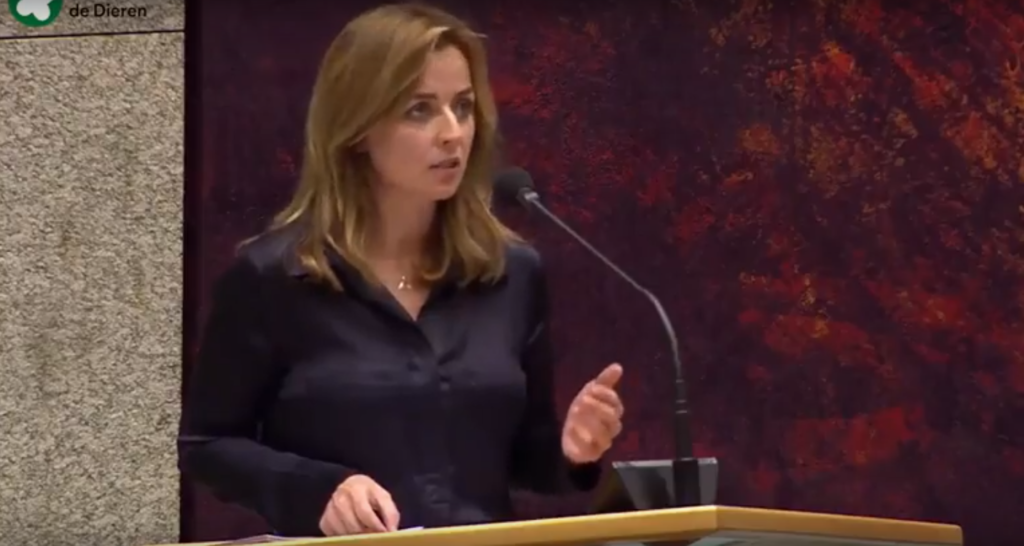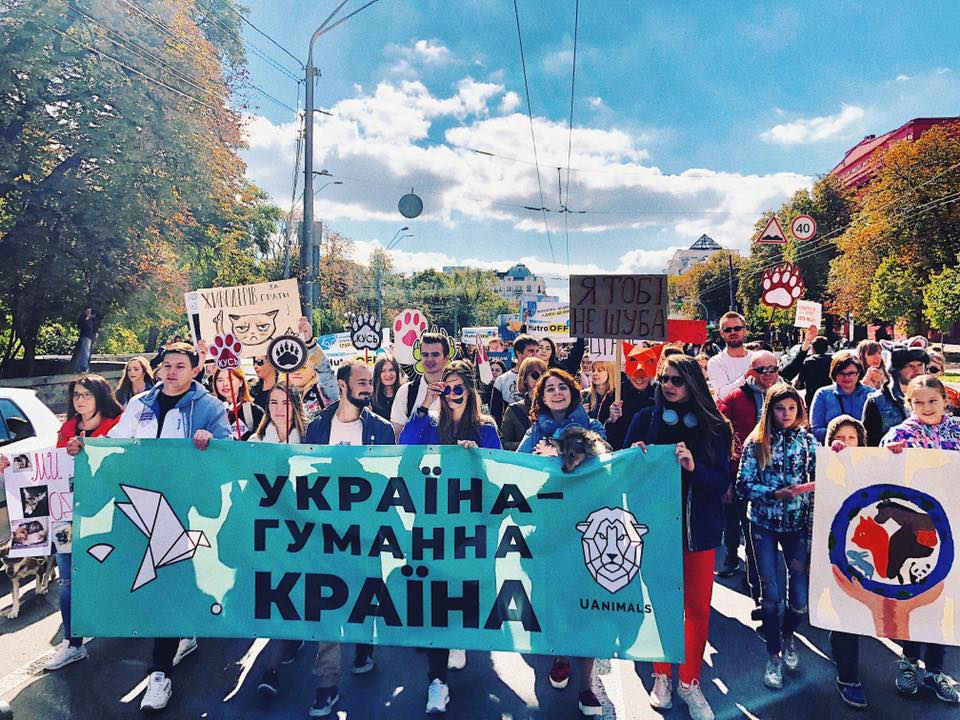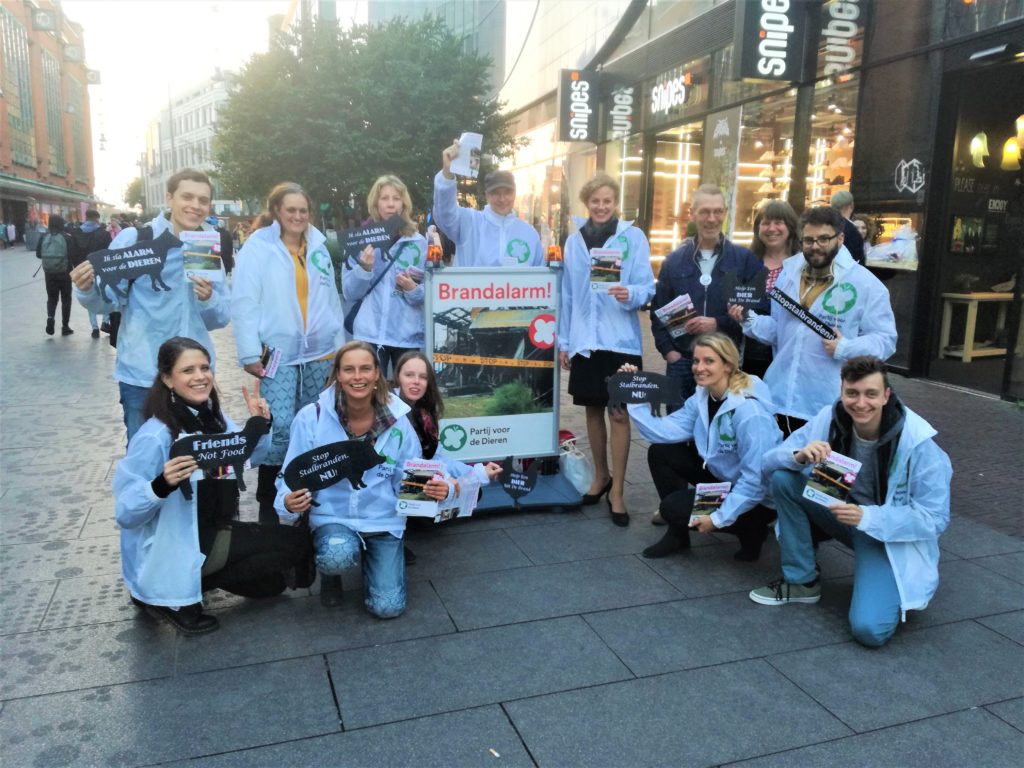Worldlog Marianne Thieme 9 October 2018
This year was the tenth time in a row we used Prinsjesdag, the most important political event in the Netherlands, to make a political statement. On Prinsjesdag, which is held every year on the third Tuesday of September, the Dutch government presents its plans for the upcoming parliamentary year. It’s customary for participants to dress in suits and fancy dresses on this day, but we want our outfits to also carry an important message.

Marianne in her ‘Vegetarian Meat Dress’ on Prinsjesdag. The dress was designed by Yasmina Ajbilou, who focuses on zero waste fashion.
I wore a dress carrying all imaginable names of vegan and vegetarian meat products currently on the market in Europe – now that I was still allowed to. Worldwide, lobbyists for the meat industry are looking for ways to remove plant-based meat substitutes from the market or make the names of the products illegal. The last convulsions of the meat industry, which clearly feels the market of cruelty-free products breathing down its neck.
The waistband of the dress carries the name of our new documentary, Powerplant. And I can hereby tell you that filming has been completed! The documentary is about the transition to a plant-based and animal-friendly society and will be released at the beginning of 2019. Around the same time, my new book on idealistic politics will be published. I cannot wait to share all this with you!
After Prinsjesdag, the state budget was discussed in the Dutch Lower House. The government’s explanatory notes on the budget, mainly consisting of self-satisfied political propaganda, proved a missed opportunity. The government congratulated itself on irrelevant figures while passing down the truly important matters, such as a strong and honest environmental policy, to other parties. Why not use the tax reform to give carbon emission its real price? Why not use the VAT increase to make sustainable consumption cheaper and non-sustainable consumption more expensive? Instead of having large companies pay to make the Netherlands sustainable, it is now mainly the citizens that are forced to cover the costs.

Our government has passed down the bill to our children and grandchildren. It has made sustainability the responsibility of companies and social organisations, and it has shied away from legal sanctions. It has been three years since Paris, and we are still making our decisions together with companies, gradually losing sight of our goals. Allowing large companies to take part in the decision-making on laws and regulations that might well increase their costs is never going to work; just as you would not allow an offender to decide on the severity of their own punishment. The same goes for agricultural policies.
Agriculture, specifically livestock farming, is facing major problems: agricultural toxins, ammonia, particular matter, soil contamination, animal suffering, food scandals. More and more experts are saying we will not achieve our climate targets unless we radically reduce livestock numbers, which inevitably means a reduction of the consumption of animal products. And the longer we wait, the more difficult and more expensive it will be for farmers to make the transition. But what does the government do? It continues to seek its salvation in so-called innovation, allowing every opportunity for further intensification and expansion. The subject of reducing livestock numbers is carefully avoided. Narrow economic interests weigh more heavily than human and animal welfare.


Pictures of animal rights protests in Turkey and Ukraine
It is so good to see that, despite the meat industry lobbyists, the animal rights movement is growing on a global scale. For example, a march for animals was organised by Ukrainian animal rights organisation UAnimals in 20 different Ukrainian cities. It was a huge success: in the capital Kiev alone, more than 6,000 people joined the march. On Buyukada, the largest island of Turkey, a protest was organised against animal suffering and the tourist horse-drawn carriages. Last Sunday, many people participated in a Vegan March in Istanbul in order to raise awareness about the great injustice we inflict on animals.
Our sister parties are also very successful. Thanks to our Spanish sister party PACMA, 100,000 people in Madrid took to the streets to demonstrate against the cruel practice of bullfighting. Last week, our Portuguese sister party PAN ensured that the tax exemption for bullfighters will most likely be abolished. As of next year, bullfighters will have to pay taxes just like any other citizen. An important step towards a ban on bullfighting in Portugal.

On World Animal Day, the Party for the Animals draws attention to the farm fires killing hundreds of thousands of animals every year
Last week it was World Animal Day. In several cities in the Netherlands, the Party for the Animals drew attention to the hundreds of thousands of animals burnt alive each year in farm fires. The reason that this is still happening in the Netherlands is purely a political one: a majority of the Lower House systematically votes against stricter fire safety regulations. At the moment, toilet paper is better protected from fire than animals. Unbelievable.
The future is plant-based, and this vegan woman of 96 knows it. An inspiration to us all.
Kind regards,
Marianne
Pela décima vez em seguida aproveitamos a tradição política mais importante da Holanda, o Dia dos Príncipes, para fazer uma declaração. No Dia dos Príncipes (sempre na terceira terça-feira de setembro) o governo holandês apresenta seus planos para o ano parlamentar vindouro. É costume as pessoas usarem vestidos e ternos muito bonitos. Nós escolhemos roupa que transmita uma mensagem importante.

Marianne no seu ‘Vestido Carne Vegana’ no Dia dos Príncipes. O vestido foi desenhado por Yasmina Ajbilou, que se concentra na moda sem desperdício.
Eu usei um vestido enfeitado com todo tipo de nomes de ‘carnes’ veganas e vegetarianas que os diversos provedores na Europa vendem neste momento. Por enquanto isto ainda é possível. Lobistas da indústria da carne no mundo inteiro querem frustrar o uso de substitutos vegetais da carne e tornar punível o uso dos nomes destes produtos. As últimas convulsões da indústria da carne que claramente está sendo alcançada pelos produtos sem sofrimento animal.
No cós do vestido pusemos o nome de nosso novo documentário: Powerplant. E já podemos comunicar que as filmagens acabaram de ser concluídas! O documentário trata da transição para uma sociedade mais vegetal e mais amigável aos animais e aparecerá no início de 2019. Então, também meu novo livro sobre política idealista estará nas lojas. Queria que chegasse logo o momento de partilhar tudo isso com vocês!
Após o Dia dos Príncipes tratamos do orçamento nacional na Câmara Baixa. A explicação do governo sobre o orçamento foi uma tremenda propaganda política complacente e sobretudo uma oportunidade perdida. O gabinete felicita a si mesmo com números irrelevantes e passa adiante aquilo que realmente é importante ou seja uma política ambiental forte e honesta. Porque não aproveitaram a reforma tributária para dar um preço real às emissões de CO2? Porque não aproveitaram o aumento do IVA para baixar o custo do consumo sustentável e aumentar o do consumo insustentável? Em vez das grandes empresas ajudarem a pagar pela sustentabilidade, agora é o cidadão que paga a maior parte do custo.

O gabinete empurra a conta adiante para nossos filhos e netos, bota a sustentabilidade na conta das empresas e organizações sociais e afasta-se de sanções legais. Por isso, mesmo três anos após Paris continuamos a deliberar enquanto que o alvo torna-se sempre mais fora da vista. Permitir às grandes empresas tomar parte nas decisões sobre leis e regras que vão aumentar seus custos não vai dar certo. Também não se permite que um transgressor ajude na decisão sobre a altura de sua punição. A mesma coisa vale para a política agrícola.
A agricultura e principalmente a criação de gado enfrenta grandes dificuldades: tóxicos agrícolas, amoníaco, pó fino, poluição do solo, sofrimento animal e escândalos alimentares. Sempre mais peritos afirmam que não vamos atingir as metas do clima sem um encolhimento radical da pecuária e que por isso precisamos restringir o consumo de produtos animais. E quanto mais esperarmos, mais difícil e cara será a mudança para os agricultores. O que faz o gabinete? Continua buscando refúgio na assim chamada inovação e concede toda oportunidade a intensificação e escalada. O encolhimento da pecuária é cuidadosamente evitado. Interesses económicos a curto prazo pesam mais que o bem-estar animal e humano.


Fotos de manifestações para direitos animais na Turquia e Ucrânia
É muito bom ver que o movimento para os direitos animais cresce mundialmente, não obstante o lobby pró-carne. Assim, a organização para direitos animais ucraniano UAnimals organizou passeatas para os animais em 20 cidades na Ucrânia. Foi um grande sucesso: só na capital Kiev mais que 6000 pessoas tomaram parte da passeata. Também em Buyukada, a maior ilha da Turquia, houve um protesto contra sofrimento animal e carruagens (turísticas) puxadas por cavalos. No domingo passado muitos participaram numa Passeata Vegana em Istambul chamando a atenção para a imensa injustiça cometida contra os animais.
Nossos partidos irmãos também têm sucesso. Assim, o partido irmão espanhol PACMA conseguiu juntar 100.000 pessoas em Madrid para protestar contra as cruéis touradas. O partido irmão português PAN conseguiu na semana passada que a exceção para toureadores de pagar imposto muito provavelmente será abolida. A partir do ano que vem os toureadores terão que pagar imposto como qualquer outro cidadão. Um passo importante a caminho da proibição das touradas no Portugal.

No Dia Mundial dos Animais o Partido para os Animais chamou a atenção para as centenas de milhares de animais que perecem nos incêndios nos estábulos
Na semana passada houve o Dia Mundial dos Animais. O Partido para os Animais chamou a atenção em diversos lugares na Holanda para as centenas de milhares de animais queimados vivos cada ano nos incêndios nos estábulos. Que isto continua acontecendo na Holanda é puramente uma escolha política: uma maioria na Câmara Baixa sempre vota contra regras de segurança mais rigorosas no caso de incêndios. Na Holanda papel higiênico é melhor protegido contra incêndios que os animais. Incompreensível.
O futuro é vegetal. Uma coisa que esta senhora de 96 anos também sabe. Bela inspiração para todos nós.
Saudação!
Marianne